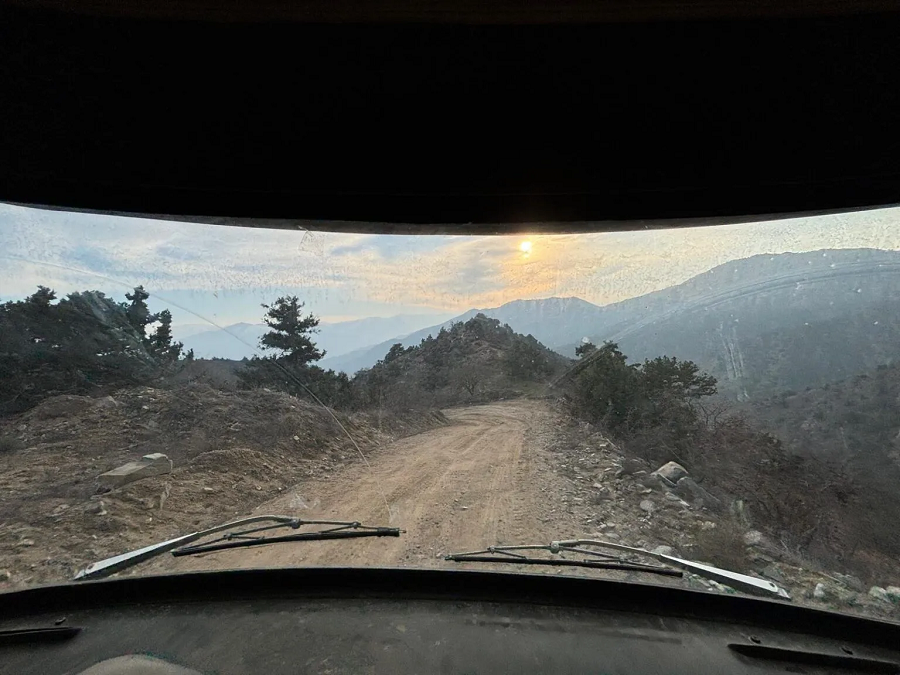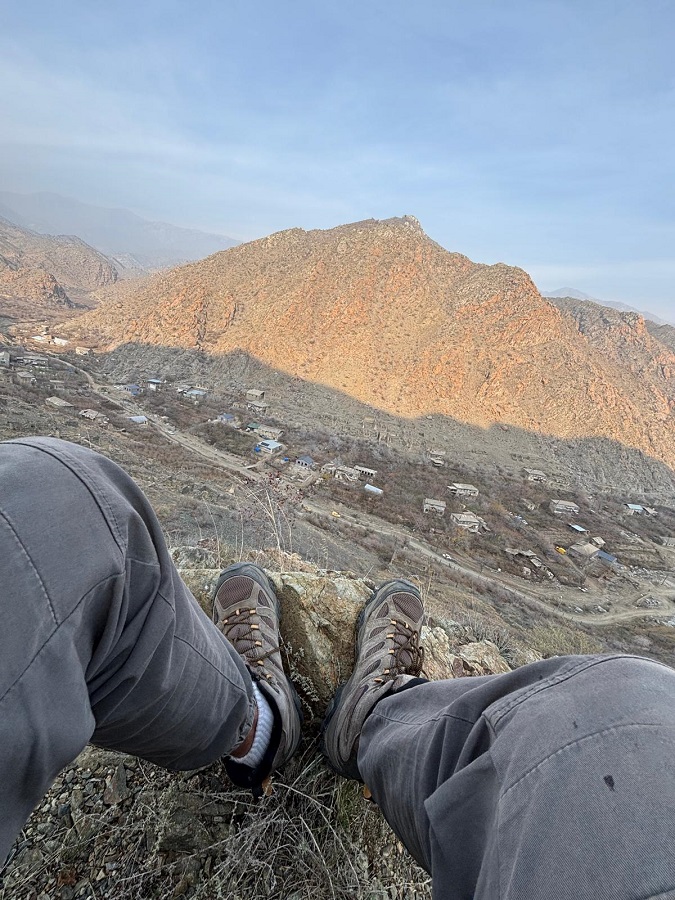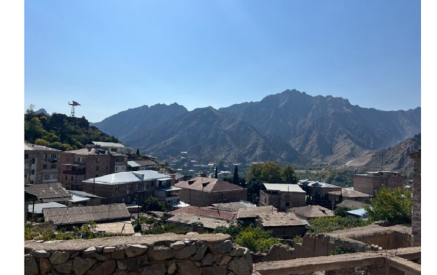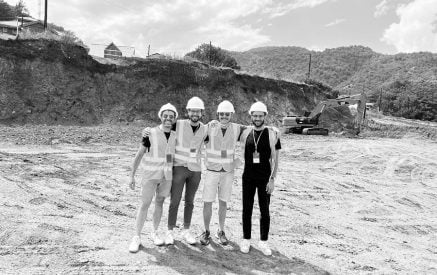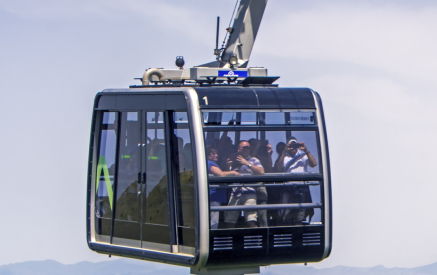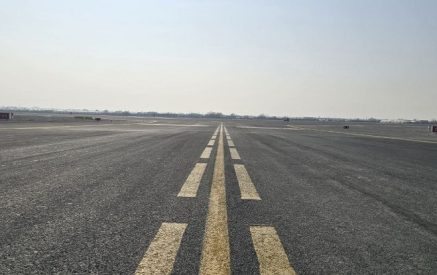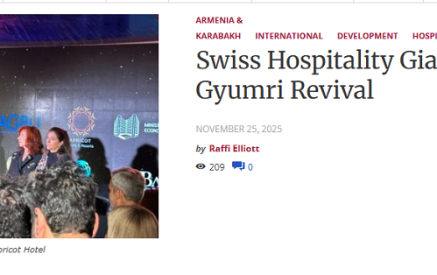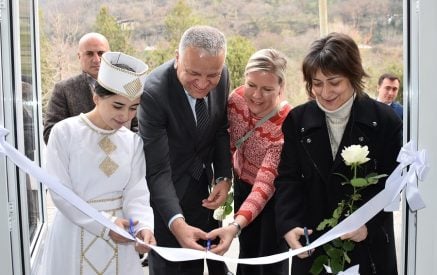Syunik, the southernmost province of Armenia, is home to a vibrant Armenian community. I was fortunate to visit the Chitchian family and spend a day in the village of Nrnadzor with my family. I was so astounded by the beauty and history of the village that I decided to return and stay for a week.
Nrnadzor, which translates to ‘pomegranate valley,’ is a small village in Syunik with around 150 people. Historically, it neighbored Artsakh, but due to recent wars and shifting geopolitics, the nearby border is now controlled by Azerbaijan covering the Zangilan region, with Iran lying directly south. Geographically, Syunik is a thin piece of land around only 40 kilometers wide, sandwiched between Azerbaijan and Nakhichevan — a landlocked region controlled by Azerbaijan — making it a strategic target. The only road to Nrnadzor from the local town, Meghri, is the old railway linking Azerbaijan to Nakhichevan, which Azerbaijan has publicly threatened to take control of.
Despite these challenges, Nrnadzor remains one of Armenia’s most stunning locations, with its vibrant nature, towering mountains, tight community and history.
Read also
After a long, cramped yet incredibly scenic bus ride to Meghri, I was warmly greeted by Sash Chitchian and his mother Seda. By way of introduction through my brother Areg and our diasporan friend from the AYF Garin Bedian, I had found a family to stay with in one of Armenia’s most remote villages.
As it was my first time traveling alone and away from my parents, you might think that I was nervous. But the Chitchian family was unlike any other. From the moment I arrived, they made me feel like I was part of their family, creating an immediate sense of belonging and comfort.
The next morning, we were ready to begin our village journey. Sash was on duty to herd their cows and I was paired with him for the task. With a backpack full of water and several jackets to brace against the freezing weather, we set off into the mountains.
The hike was unlike anything I’d experienced before. For two hours, we trekked up and down mountains, navigating through dense shrubs and climbing steep inclines. There was no trail — just raw nature. You may think that when you reach the top of a mountain, you will see lots of land in front of you. Instead, we saw another six or seven mountain peaks ahead, mountain after mountain — something I had not experienced before.
The freezing cold made it impossible to take off our jackets, even as we sweat from the exertion. Every step was a challenge, especially when climbing big rocks with bare hands, but Sash moved with remarkable ease, showing his upbringing in these mountains. He was always 10 steps ahead, often pausing for me to catch up. This was his home — and it showed in his agility and confidence on the terrain.
After hours of searching for the livestock, we finally brought the cows back to the village. They normally return alone, but sometimes wander and can’t find their way back. This happened once when the Chitchian family owned 13 horses. When the borders changed after the war, the horses crossed the new border and the family lost valuable livestock.
As we approached the house, Seda and her husband Vatcho were waiting for us with tea and warm homemade food — a small gesture that felt like pure gold after the freezing hike. However, the day was far from over.
At home, it was time to chop wood to keep the fire going, as evening temperatures were approaching 0 degrees Celsius. I was exhausted from the hike but Sash was just getting started. I was the light man, holding a flashlight, while Sash did all the chopping.
I realised how long and hard their days are. These are things we may do on a weekend getaway with friends, but for the Chitchians, this is their daily life. It was humbling to experience even a fraction of it.
The next day, after a quick breakfast, Sash, Vatcho and I went on a mission to get more wood for the furnace. This was a challenge. We had to drive on rugged roads for a while in search of a fallen dry tree. The roads were so rocky that we would occasionally bump our heads on the roof of the car as we bounced up and down.
After an hour, we found a tree we could use. Then, we had to climb up a small hill to reach it. It was not easy, as loose rocks continuously slid under our boots. Sash and Vatcho led the way, carrying a chainsaw and an axe while I crawled up the hill on all fours.
Once we reached the tree, Sash and Vatcho began cutting it down into smaller pieces to fit in the truck. Sash made it look easy — using the axe with full strength and slicing it directly down the middle. He did this all with just one healthy hand, as he lost movement in his left hand while serving in the war in Artsakh at only 18 years old. I tried to have a go using the axe but failed miserably, barely making a dent in the wood. We continued on as Sash and Vatcho used the chainsaw and axe to cut the tree, while I carried each piece to the truck.
After hours of work, we finished and made our way back to the village. It was late afternoon by the time we arrived and Seda had prepared a meal for us — freshly baked bread, homemade cheese and manti. Seda had found out a couple days prior that manti is my favorite dish, so this gesture was especially touching.
That evening, as we sat around the fire sharing stories, I felt an overwhelming sense of appreciation. The Chitchian family’s resilience, hospitality and deep connection to their land were inspiring. They lived with so little but gave so much, embodying a richness that can’t be measured in material terms — and they were content, no matter the circumstances.
During my week in Nrnadzor, every day brought new experiences. One of the most memorable moments came on my last evening in the village. I climbed a mountain overlooking the village at sunset. The golden light bathed the mountains and the village below looked like a painting. I stood in silence, as all I could do was appreciate it. This small community has held its ground despite the challenges of isolation and geopolitics.
Leaving Nrnadzor was bittersweet. I was eager to share my experiences with friends and family back home, but a part of me wanted to stay longer, to learn more and to contribute in some way to this incredible place.
The week I spent in Nrnadzor didn’t just teach me about the village — it taught me about resilience, the value of community and the profound connection Armenians have to their land, which they are prepared to fight and die for. It was an experience that will stay with me forever and I will visit again soon.



















































